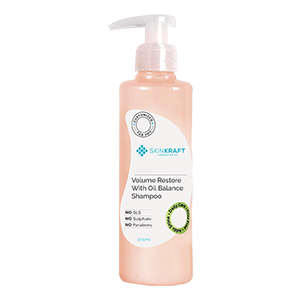Did you know that DHT increase is one of the most common causes of hair loss across the world? Dihydrotestosterone or DHT is a hormone that binds to the receptors in your scalp and induces hair loss.
If you're wondering how you can stop or control DHT hair loss, the good news is that there are several DHT blockers available in the form of medicines, shampoos and foods. Let's find out what they are and how they can treat hair loss caused by increasing DHT.
Highlights:
What Is DHT? What Does A DHT Blocker Do?
Dihydrotestosterone or DHT is a hormone present in both men and women. The production of DHT occurs by the conversion of testosterone by the testes and prostate in men and the ovaries in women. This happens with the help of an enzyme called 5-alpha reductase (5-AR).
DHT plays a significant role in puberty and helps males develop and maintain male characteristics like muscles, facial hair, deep voice, etc. In women, it helps regulate organ functions and plays a role in the synthesis of estrogen. As you grow older, these hormones help preserve muscle mass and promote sexual fertility and health.
With age, the levels of DHT can increase and contribute to hair loss. When DHT freely flows through your bloodstream, it can bind to the receptors on the hair follicles. This causes the follicle to miniaturize or shrink and eventually, the growth of new hair halts. So despite all of DHT’s benefits, it’s also one of the reasons you lose your hair.
Excess production of testosterone leads to high levels of dihydrotestosterone. This can be a struggle for both men and women. For men, you can notice some identifiable changes like an enlarged prostate and prostate cancer. In women, it causes excess hair on the body and face, issues with menstruation and adult acne.
Similarly, having too little DHT results in a delay in the onset of puberty for both men and women. Other than this, low DHT has fewer effects on women than men because DHT function is so closely related to male characteristics.
Males with low levels of DHT may face late or incomplete development of sex organs, increase in the risk of developing aggressive prostate tumors and changes in body fat distribution, causing conditions such as gynecomastia. They may also not develop normal body hair growth.
1. Why DHT Affects People Differently?
Your predisposition to hair loss is genetic, meaning it’s passed down from your family.
If your father experiences male pattern balding and you’re a male, there is a high possibility that you will display identical balding patterns as you age. DHT has a more pronounced effect since you’re already inclined to male pattern baldness.
2. DHT Blockers
A DHT blocker can help restore natural levels of the DHT hormone. Unfortunately, DHT blockers do not magically erase the negative effects of male pattern baldness. Rather, when you add them to your daily routine, they slow down or prevent further hair loss.
Before you purchase every remedy on the shelf with DHT in the description, know this - there is no magical elixir for treating hair loss. Every treatment takes time to show results. Research illustrates that there are plenty of ways to manage balding, so it doesn’t get out of control.
Why Does DHT Lead To Hair Loss?
Every single strand of hair on your body grows out of a structure or tiny capsules known as follicles, which lie underneath your skin. Each follicle undergoes a growth cycle that includes four phases:
- Anagen or growing
- Catagen or transitional
- Telogen or resting
- Exogen or shedding
At the end of each cycle, hair enters the resting phase before it eventually falls out. The follicle then produces new hair, and the cycle starts over.
When DHT builds up in the hair follicles with time, it disrupts the growth cycle. It shortens the hair growth cycle, shrinks your hair follicles in a process called miniaturization. Hair reproduces at a slower rate (remaining in the resting phase for longer or reducing the growing phase). With excess DHT, once old hair falls out, it takes longer for new hair to grow.
DHT's adverse effect on the follicle makes your hair brittle, thin, fragile, lighter in color and it falls out faster with each subsequent life cycle. Ultimately, the follicles shut down and no longer produce hair.
Depending on the androgen receptor (AR) gene, certain individuals are more prone to the effects of DHT on the scalp hair. The AR gene may boost androgen receptivity in the follicles present in your scalp, resulting in higher chances of experiencing male pattern balding or hair loss.
How To Treat DHT Hair Loss?
1. DHT Blocker Medicine (Finasteride)
A study in the American Academy of Dermatology [1] revealed that finasteride is an effective DHT blocker. It works dual roles - halts hair loss and helps with future growth.
Another study by the Journal of Investigative Dermatology [2] discloses that in men who took 1mg of finasteride, 66 percent men experienced some regrowth and 83 per cent were able to preserve their original hair follicle counts.
In the scientific world, finasteride is known as a ‘5-alpha reductase type 2 inhibitor’ or an ‘anti-androgen’. Meaning the drug works to inhibit androgens like DHT.
Finasteride’s inhibitory traits may be because of its ability to halt the conversion of testosterone into DHT.
Some side effects of finasteride include itchy skin, weight gain, dizziness, chills, etc. Hence, you must visit a dermatologist before you use this drug.
2. DHT Blocker Shampoos/Hair Oils
You’ll find numerous DHT blocking shampoos and oils in the market. They’re an excellent solution to slow down hair fall or loss. A combination of the active ingredients like saw palmetto, biotin, ketoconazole and more reduce the production of Alpha 5 Reductase and inhibit the production of DHT.
Shampoos work by reducing excess DHT, creating a conducive environment for the growth of hair, cleansing the scalp, unclogging blocked pores, improving the flow of blood to the scalp and giving hair an overall healthier appearance.
Look for ingredients like:
1. Ketoconazole
An active ingredient in DHT blocking shampoos which has a link to the disruption of DHT. [3] Ketoconazole inhibits 5AR thereby, reducing the body’s production of DHT, and greatly diminishing hair loss.
2. Pumpkin Seed Oil
Many plant-based oils help treat several conditions, one of them is hair loss. It’s said that the phytosterols promote hair growth and block enzymes and hormones in the scalp that cause hair loss. [4]
Massage pumpkin seed oil into the scalp with any carrier oil of your choice like olive oil. Leave it in for a few hours or overnight before you wash it off.
3. Saw Palmetto
Saw palmetto is an extract from the berries of serenoa repens, a type of palm tree. Similar to other components, there is a belief that this too inhibits the activity of 5-alpha-reductase.
3. DHT Blocker Food List
There are many DHT blocker foods which block the production of DHT and thwart the action of DHT, attaching itself to hair follicles.
For example, foods like kale, mushrooms, spinach, etc. Other natural DHT blockers rich in lycopene are mangoes, carrots, watermelons and tomatoes. Natural DHT blockers with a high content of biotin like bananas, oily fish, legumes, liver and berries create a healthy environment for strong hair while conditioning the scalp and skin.
Some other foods you can include in your diet are bone soup, sesame seeds, black pepper, pumpkin seeds and soybeans.
4. Vitamin Supplements
A. Vitamin B3 Or Niacin
It’s an essential nutrient which increases blood circulation in the scalp, thereby promoting hair growth. [5] Including foods like sunflower seeds, liver, mushrooms, fish and fish oils, green peas and avocado will give you your daily dose of niacin. If your doctor recommends it, you can also consume a niacin supplement.
B. Vitamin A
Hair is one of the fastest growing tissues in the human body and all cells, including hair, require Vitamin A for growth.
Vitamin A also assists in the production of sebum, which helps moisturize the scalp and keeps your hair looking healthy. [6] Those who have a deficiency of Vitamin A can notice several issues and hair loss is one among them. [7]
Excellent sources of Vitamin A include kale, spinach, pumpkin, carrots, sweet potato, yogurt, eggs and milk.
C. Biotin
According to a study, a lack of biotin results in hair loss. [8] Biotin is a B vitamin and B vitamins help transport nutrients and oxygen to the scalp, which encourage hair growth.
A few superb sources are leafy greens, seafood, meat and whole grains.
D. Vitamin C
Vitamin C is a powerful antioxidant which helps in the production of collagen. Additionally, Vitamin C also aids in the absorption of iron, a mineral that promotes hair growth.
Citrus fruits, peppers, guavas and strawberries are all rich in Vitamin C.
E. Vitamin D
When your levels of Vitamin D are low, the possibility of hair loss is higher. [9] Additionally, this vitamin stimulates the generation of new follicles from which hair grows.
Apart from the sun rays, you can get Vitamin D from fortified foods, mushrooms, cod liver oil and fatty fish.
F. Zinc
Other than keeping oil glands and follicles working properly, zinc’s part in tissue growth and repair is immense. It’s seen that a common symptom of low levels of zinc is hair loss. [10]
Good sources include pumpkin seeds, wheat germ, spinach, beef, lentils and oysters.
How To Test DHT Levels?
To know your DHT levels, visit a dermatologist or doctor who may suggest a saliva panel test and or a blood test. It’s recommended that you get the test done after consulting with a professional, especially if you’re concerned about DHT and hair loss.
Dermatologists are trained to identify hair loss or male pattern baldness and will offer proper, effective guidance and the necessary steps you need to take.
What Are The Side Effects Of DHT?
Abnormally high levels of DHT may cause the following side effects:
Women may experience:
- Acne
- Absence of menstrual periods (amenorrhea)
- Depression
- Excessive growth of hair on the back, chest and face (hirsutism)
- Obesity
Men may experience:
- Prostate cancer
- Enlarged prostate
- Coronary heart disease
- Slow healing after an injury
An increase in DHT levels in the body can cause a few individuals to experience sleep apnoea, aggression and excessive sweating.
Wrapping Up
One of the first steps to fight hair loss is to keep yourself informed in a smart, scientific way and make use of actual facts. Turn your anger and frustration on genetic hair loss to a positive one and find solutions that help manage the problem, rather than creating new ones.
1. https://pubmed.ncbi.nlm.nih.gov/28396101/
2. https://www.jidsponline.org/article/S0022-202X(15)52935-7/fulltext
3. https://pubmed.ncbi.nlm.nih.gov/14729013/
4. https://www.ncbi.nlm.nih.gov/pmc/articles/PMC4017725/
5. https://pubmed.ncbi.nlm.nih.gov/14642410/
6. https://pubmed.ncbi.nlm.nih.gov/21914489/
7. https://pubmed.ncbi.nlm.nih.gov/453058/
8. https://pubmed.ncbi.nlm.nih.gov/19727438/
Recommended Products
Was this Article helpful?
- Least helpful
- Most helpful





